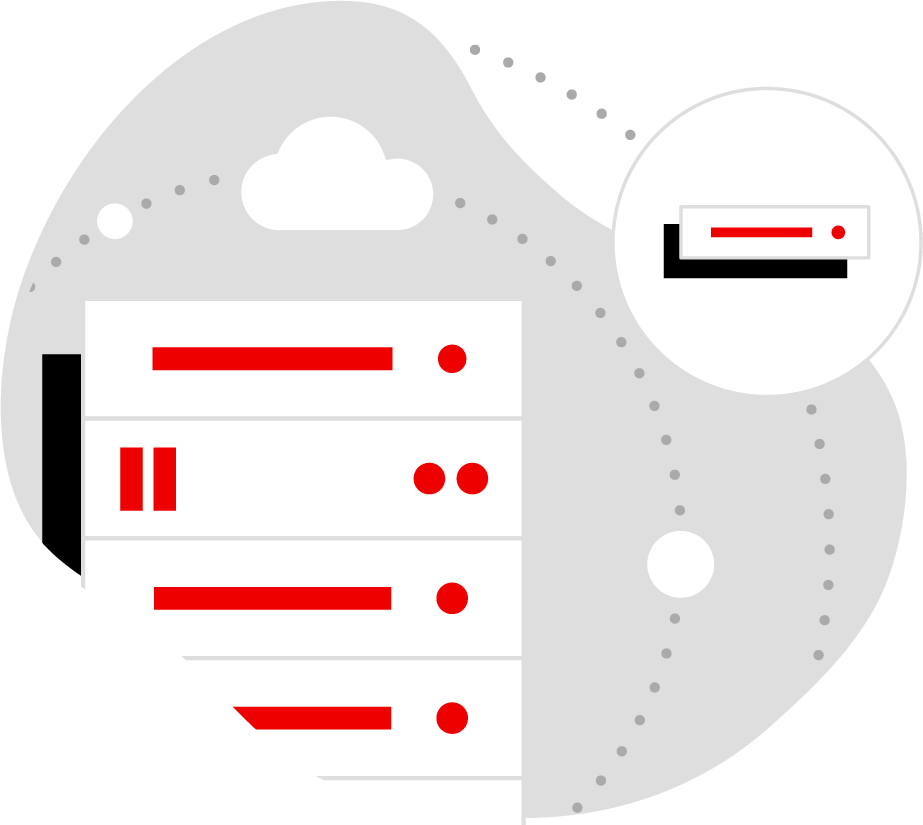Edge
Red Hat Edge
The enterprise open source platforms helping IT leaders solve their business’ challenges are the same platforms you can deploy closer to where data is collected: at the edge.
Red Hat’s edge computing approach extends our hybrid cloud capabilities to help organizations innovate with flexible and security-focused edge technology. Respond to rapidly changing market conditions, create differentiated offerings, and improve operational outcomes faster than ever before.
Why does open innovation matter for edge?
Edge computing requires industry-wide collaboration to support its broad range of use-cases and ecosystem. No single vendor will be able to provide the complete edge computing solution, so open innovation is needed to ensure you can find interoperable solutions and avoid vendor lock-in.
Red Hat’s edge computing solutions are built from open source, community-driven innovation. This means more people developing solutions to edge computing business needs - openly and transparently. This allows organizations of all sizes to benefit from innovating faster, deploying edge computing to process data closer to the source, and gain actionable insights.
Find out what’s next
Security
Security
According to the 2023 Red Hat Security at the Edge report, nearly 70% of decision makers admit that security of their edge network is top of mind.
With Red Hat’s multi-layered security approach, organizations have continuous access to updates distributed from a protected channel. Automated controls and policies will maintain proper security, governance, and compliance. Using the same platform, organizations can ensure software is updated consistently with data security measures to prevent vulnerabilities.
Automation & Management
Automation & Management
As the number of edge devices and servers continues to grow, so does the need to scale management in highly distributed locations.
With Red Hat, management of edge architectures is simplified by using tools and processes that help drive operational consistency, helping your team scale alongside your architecture. Our product suite can automate edge devices even for your multi-cluster/multi node management environment.
Partner Ecosystem
Partner Ecosystem
Red Hat’s extensive partner ecosystem minimizes integration needs, shortens time to market, and allows for scalability when your organization needs it. Red Hat works with leading certified ecosystem partners, instilling confidence from the start, and granting flexibility to customize your unique solution. We work with your technical teams to ensure they use the latest information and releases for a seamless integration to run your business.
Interoperability
Interoperability
Successful edge expansion depends on consistent management and minimized complexity. According to the IDC, adoption of enterprise open source technologies and, ultimately, an open hybrid cloud helps minimize vendor lock-in, facilitates standards-based integration, and leans on the open source community to accelerate the development of new capabilities.
Success at the edge
Success at the edge looks different for everyone but getting there shouldn’t be painful. Red Hat provides the platforms that support your unique workloads, wherever and whenever you need them. Learn how your industry is succeeding at the edge.
Automotive
In-vehicle software system updates are complex and often require lengthy development periods. Red Hat and General Motors (GM) intend to make these complex updates simpler and more frequent with Red Hat’s In-Vehicle Operating System. This continuous approach implements a functional-safety certification into the GM software platform, offering developers more options, responsibly, in a fraction of the time.
Manufacturing
Manufacturers are harnessing edge technologies to increase productivity, enhance product quality, and continually develop adaptable processes to address ever-changing customer demands and regulations. Siemens found new ways to improve operations and optimize product application updates with Red Hat® OpenShift® and its modular, responsive architecture. This approach unlocks open innovation and fosters a prosperous ecosystem, ultimately enhancing supply chain performance and delivering outstanding customer experiences, without disruption or cause for security concerns.
Telecommunications
The edge footprint continues to grow and telecom providers are looking for consistency when deploying edge compute, even where there’s intermittent connectivity. Together, Verizon and Red Hat deployed Red Hat OpenShift to standardize the developer and applications experience from anywhere in the Verizon 5G Edge. Now, deployments are easily managed from a single pane of glass, using Red Hat Advanced Cluster Management for Kubernetes (ACM) for more unified operations.
Retail
Digitalization is key as online shopping saturates the retail market. To stay competitive, the German retailer, Schwartz Group needed an agile automation workflow that increased their flexibility and efficiency. With a rapidly growing international presence, Schwartz Group needed to balance consistent store management and the ability to open new stores quickly. Red Hat® Ansible® Automation Platform automated workflows and management for better visibility into their global operations and to decrease their time to market.
IT Edge
Edge allows any IT customer to extend application services to remote locations. This means that stores, restaurants, branch offices, transit stations, and many other remote locations can leverage edge computing to solve a broad spectrum of problems inherent in distributed IT deployments. Utilities company, BrianzAcque did this by distributing data processing using microservices to analyze and market water quality at consumer fill up stations.
Red Hat Edge Validated Patterns
Explore a series of edge computing configurations that bring together the Red Hat portfolio and technology ecosystem to support common use cases.
Red Hat CTO Chris Wright explains and explores edge computing.
Scale to the edge with Red Hat
Your IT strategy (and the software making it a reality) doesn’t need to change just because workloads are moving from servers in datacenters to edge devices hosted on clouds.
Everything should just work. Everywhere.
This is our approach to edgeThe Red Hat Edge portfolio
The Red Hat portfolio of edge products brings the familiarity of our enterprise open source platforms out of your datacenter to the devices at the edges of your network.
An OS that delivers a consistent, flexible foundation built to run enterprise workloads from data center to the edge. Provides an interoperable layer between edge devices to maximize performance, manageability, and stability in any edge environment.
An enterprise container orchestration platform that extends Kubernetes capabilities to edge sites with consistent operations and application life cycle management at scale using flexible topology options to support low-latency workloads anywhere.
An automation platform that uses event-driven architecture to decouple and reactivate services based on what happens at the edges of a network.
Red Hat OpenStack Platform
A foundation to help organizations build an edge computing architecture with distributed compute nodes placed closer to network edges.
Red Hat Integration
A set of integration and messaging technologies to connect applications and data across edge locations.
The Open Farmer
Dorn Cox is optimistic for the future of farming. In this short film, Cox introduces viewers to farmOS, an open source platform for agricultural management that gives farmers all over the world a common way of organizing data and sharing best farming practices.
Get started
Talk to an expert about Red Hat Edge portfolio products




